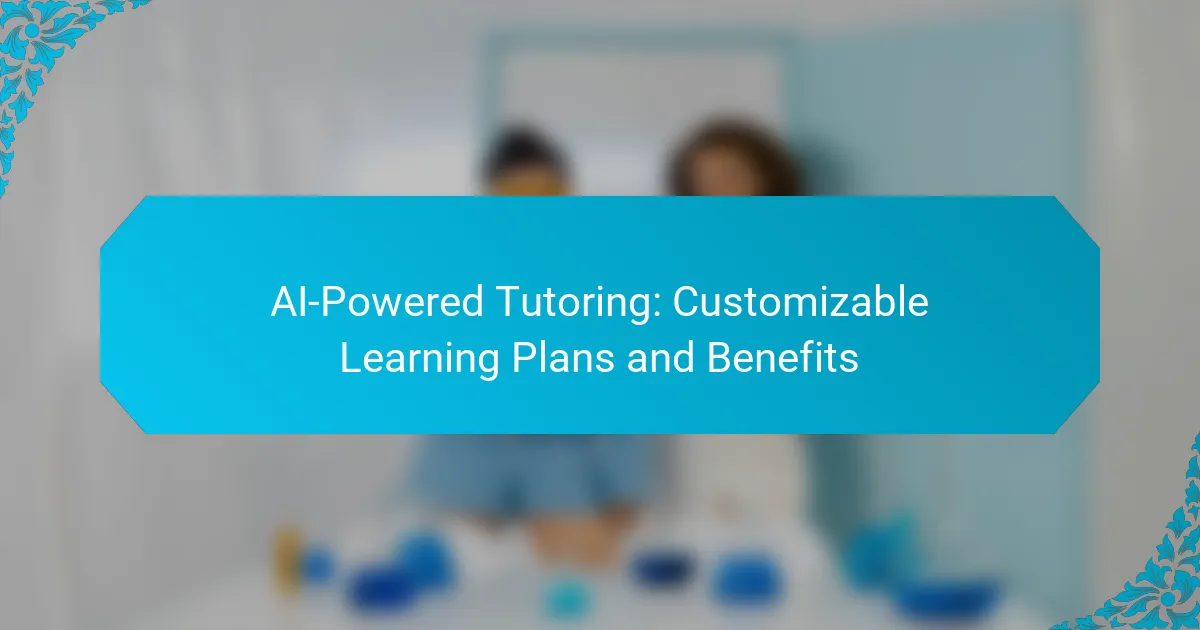AI-powered tutoring leverages advanced algorithms to deliver personalized learning experiences that cater to the unique needs of each student. By analyzing performance data, these systems adapt content and strategies, significantly enhancing the efficiency and effectiveness of the learning process.
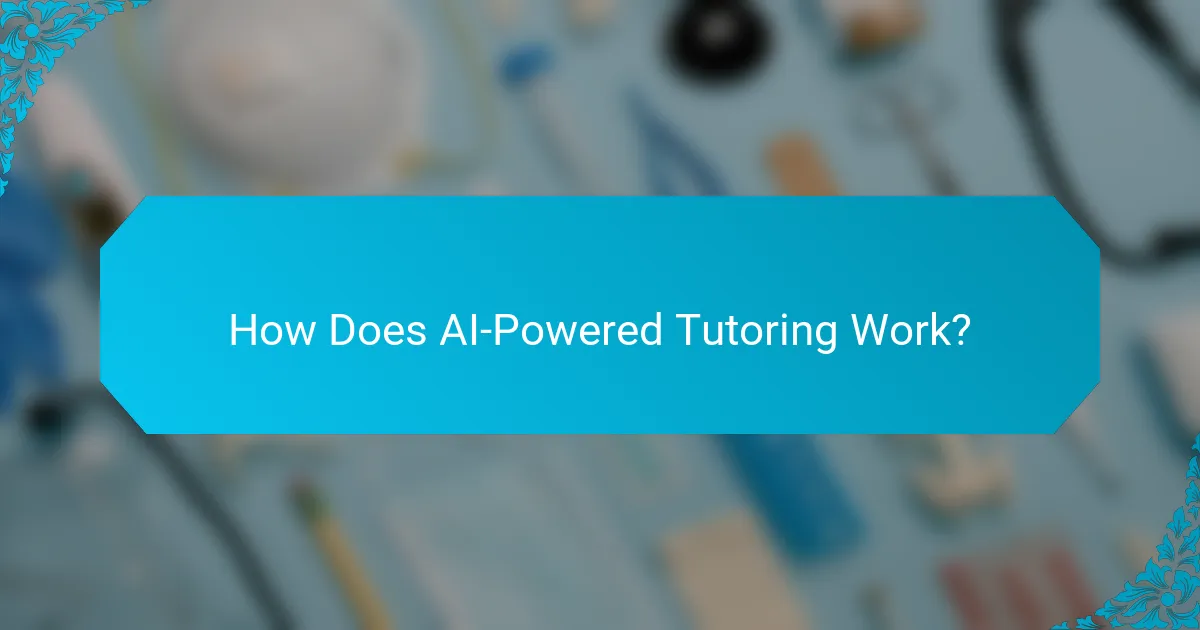
How Does AI-Powered Tutoring Work?
AI-powered tutoring utilizes advanced algorithms to create customized learning experiences tailored to individual student needs. By analyzing performance data, these systems adapt content and strategies to enhance learning efficiency and effectiveness.
Adaptive learning algorithms
Adaptive learning algorithms are at the core of AI tutoring systems, adjusting the difficulty and type of content based on student performance. For instance, if a student struggles with a particular math concept, the algorithm may provide additional practice problems or alternative explanations to reinforce understanding.
These algorithms often employ machine learning techniques, allowing them to improve over time as they gather more data about a student’s learning habits. This ensures that the tutoring experience remains relevant and effective as the student progresses.
Real-time progress tracking
Real-time progress tracking allows both students and educators to monitor learning outcomes continuously. AI tutoring platforms can provide instant feedback on quizzes and assignments, highlighting areas of strength and those needing improvement.
This immediate insight helps students stay motivated and engaged, as they can see their progress in tangible terms. Educators can also use this data to adjust teaching strategies or provide targeted support where necessary.
Personalized content delivery
Personalized content delivery ensures that students receive materials suited to their unique learning styles and preferences. For example, a visual learner might benefit from video tutorials, while an auditory learner may prefer podcasts or interactive discussions.
By curating content based on individual needs, AI tutoring systems can enhance retention and comprehension, making learning more enjoyable and effective. This tailored approach can significantly improve student outcomes compared to traditional, one-size-fits-all methods.
Feedback mechanisms
Feedback mechanisms in AI tutoring systems provide students with constructive criticism and guidance to enhance their learning. These systems can offer suggestions for improvement based on common mistakes or misconceptions identified during assessments.
Effective feedback is timely and specific, allowing students to understand their errors and learn from them. Incorporating self-assessment tools can also empower learners to reflect on their understanding and take ownership of their educational journey.
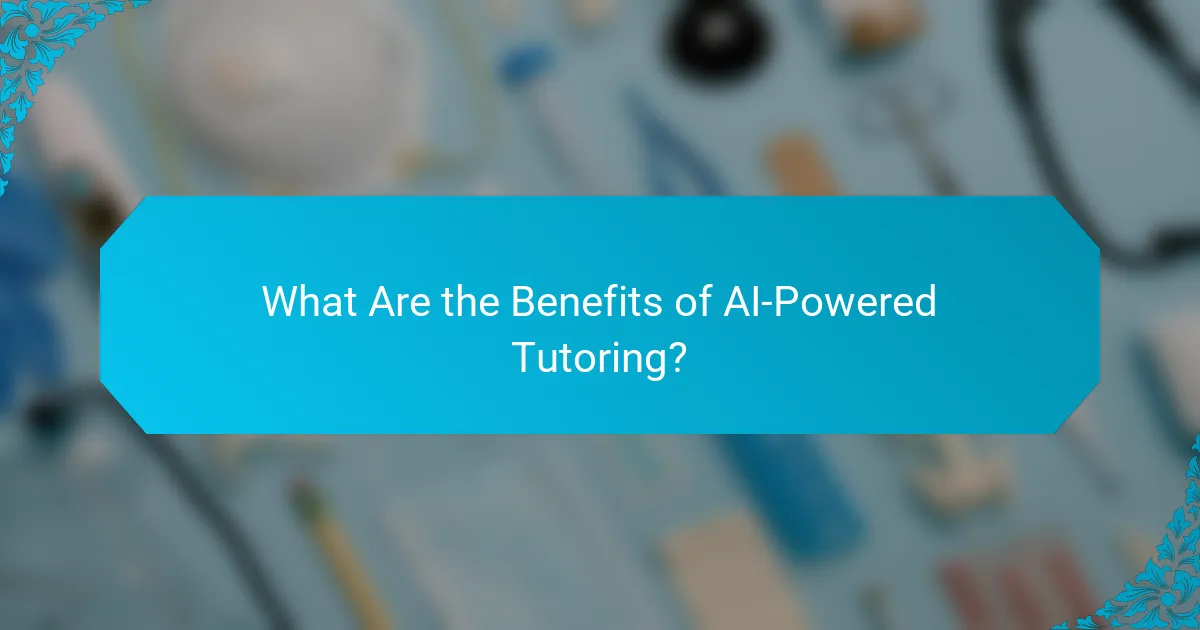
What Are the Benefits of AI-Powered Tutoring?
AI-powered tutoring offers personalized learning experiences that adapt to individual student needs, enhancing educational outcomes. This technology provides tailored support, making learning more efficient and engaging.
Customized learning experiences
AI-powered tutoring systems analyze a student’s strengths, weaknesses, and learning styles to create personalized learning plans. For instance, if a student struggles with math concepts, the AI can adjust the curriculum to focus on those areas while providing additional resources and practice problems.
These customized experiences can include varied content formats, such as videos, quizzes, and interactive exercises, catering to different learning preferences. This adaptability helps students grasp complex subjects more effectively and at their own pace.
Increased engagement and motivation
AI tutoring tools often include gamification elements, such as rewards and progress tracking, which can significantly boost student engagement. When learners see their progress visually represented, they are more likely to stay motivated and committed to their studies.
Additionally, personalized feedback from AI tutors helps students feel more connected to their learning journey. This immediate response encourages them to tackle challenges without fear of judgment, fostering a positive learning environment.
Flexible scheduling options
One of the key advantages of AI-powered tutoring is its flexibility. Students can access learning materials and receive tutoring support at any time, accommodating their unique schedules. This is particularly beneficial for those balancing school with extracurricular activities or part-time jobs.
Moreover, the ability to learn at one’s own pace means that students can spend more time on challenging topics and move quickly through areas they understand well. This flexibility can lead to a more satisfying and effective learning experience.
Data-driven insights
AI tutoring platforms collect and analyze data on student performance, providing valuable insights for both learners and educators. These insights can highlight areas where a student excels or struggles, allowing for targeted interventions and support.
Teachers can use this data to adjust their teaching strategies and provide additional resources where needed. Furthermore, parents can stay informed about their child’s progress, ensuring they can support their learning journey effectively.
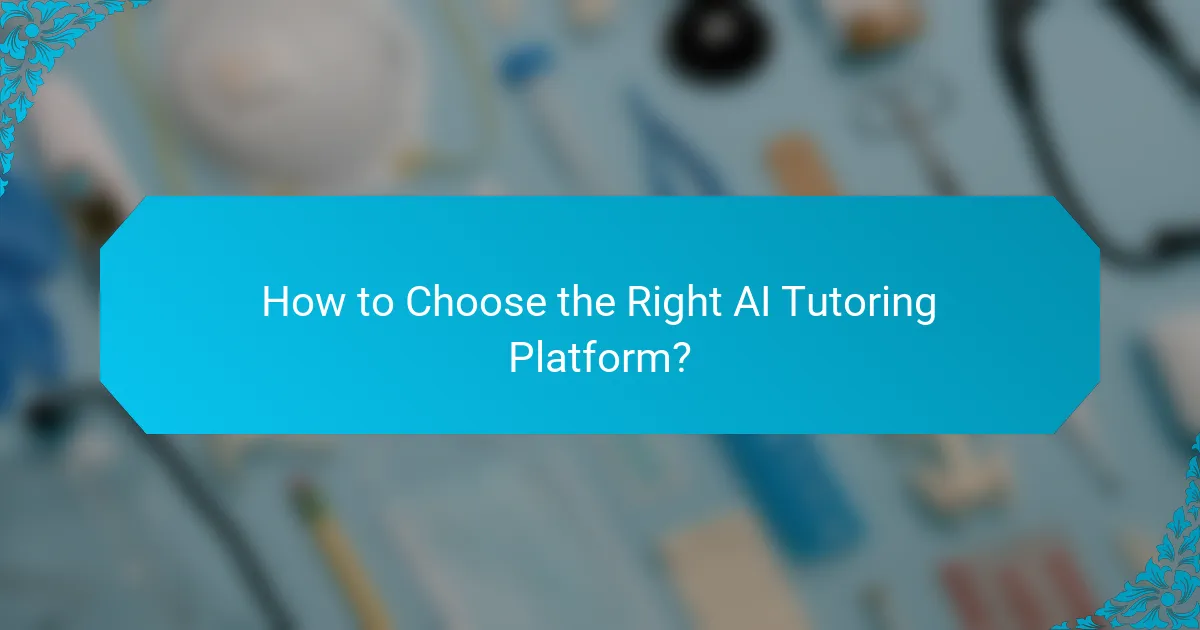
How to Choose the Right AI Tutoring Platform?
Choosing the right AI tutoring platform involves evaluating its features, pricing, and user feedback. Focus on what aligns best with your learning goals and preferences to ensure an effective educational experience.
Key features to consider
When selecting an AI tutoring platform, consider features such as personalized learning plans, adaptive assessments, and progress tracking. Look for platforms that offer real-time feedback and interactive content to enhance engagement.
Additionally, ensure the platform supports various subjects and learning styles. Some platforms may provide multimedia resources, while others might focus on text-based interactions. Choose one that fits your preferred learning method.
Pricing models comparison
AI tutoring platforms typically offer various pricing models, including subscription plans, pay-per-session, or one-time fees. Subscription plans may range from $20 to $100 per month, depending on the features included.
Compare what each pricing model offers in terms of access to resources and support. Some platforms may provide free trials or money-back guarantees, allowing you to test the service before committing financially.
User reviews and testimonials
User reviews are crucial for understanding the effectiveness of an AI tutoring platform. Look for testimonials that highlight specific improvements in learning outcomes and user satisfaction.
Check independent review sites and forums to gather a range of opinions. Be cautious of platforms with overwhelmingly positive reviews, as they may not reflect genuine user experiences. Aim for a balanced view to make an informed decision.
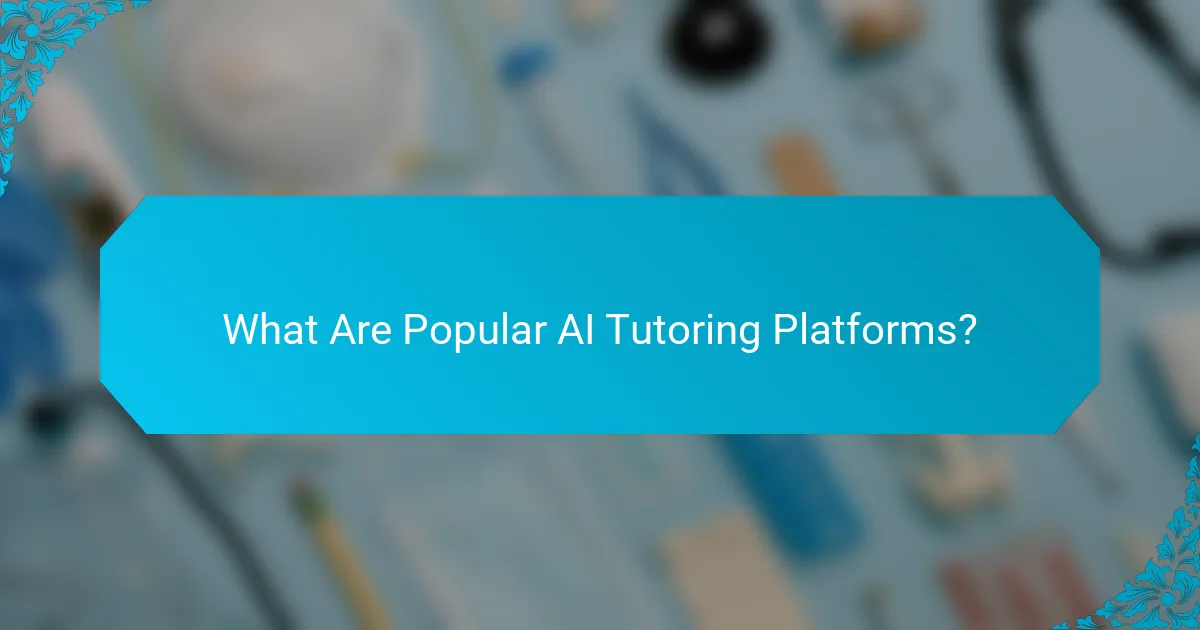
What Are Popular AI Tutoring Platforms?
Popular AI tutoring platforms leverage artificial intelligence to provide personalized learning experiences tailored to individual student needs. These platforms utilize adaptive learning technologies to create customized lesson plans, track progress, and enhance engagement.
Khan Academy
Khan Academy offers a wide range of subjects, from math to arts, using an AI-driven approach to customize learning paths. Students can access thousands of instructional videos and practice exercises that adapt to their skill levels, ensuring they master concepts before moving on.
The platform is free to use, making it accessible to learners worldwide. It also provides detailed progress tracking, allowing students and educators to identify strengths and areas needing improvement.
Duolingo
Duolingo focuses on language learning through gamified lessons powered by AI. The platform adjusts the difficulty of exercises based on user performance, helping learners progress at their own pace while maintaining engagement through interactive elements.
With a free version available and optional premium features, Duolingo caters to a global audience. Its bite-sized lessons make it easy for users to fit language practice into their daily routines, often requiring just a few minutes each day.
Smart Sparrow
Smart Sparrow specializes in adaptive elearning solutions for higher education, allowing educators to create customized learning experiences. The platform’s AI analyzes student interactions to adjust content delivery, ensuring that learners receive support tailored to their needs.
This platform is particularly useful for institutions looking to enhance their online courses. By integrating Smart Sparrow, educators can improve student engagement and retention through personalized feedback and adaptive assessments.
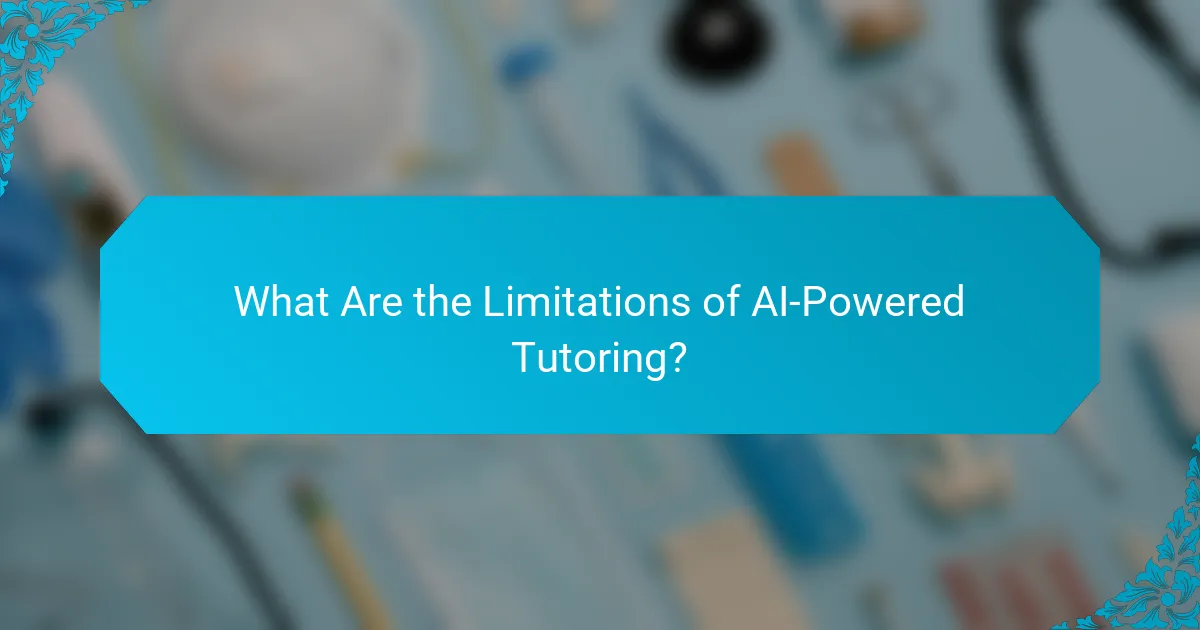
What Are the Limitations of AI-Powered Tutoring?
AI-powered tutoring systems have several limitations, including a lack of emotional intelligence, potential biases in content, and the inability to adapt to unique learning styles fully. While these tools can provide personalized learning plans, they may not always address the nuanced needs of every student.
Limited Emotional Understanding
AI tutoring systems struggle to interpret emotional cues and provide the empathy that human tutors can offer. This limitation can affect student engagement and motivation, as learners may feel disconnected from a purely algorithm-driven approach. For instance, a student frustrated with a difficult concept may benefit more from a human tutor’s encouragement than from an AI’s standard response.
Potential Biases in Learning Content
AI systems are trained on existing data, which can include biases present in that data. This means that the content delivered may unintentionally favor certain perspectives or exclude diverse viewpoints. Educators should review the materials provided by AI tutors to ensure they are balanced and inclusive, particularly in subjects like history or literature.
Inability to Fully Adapt to Unique Learning Styles
While AI can analyze performance data to create customized learning plans, it may not fully accommodate every student’s unique learning style. For example, a visual learner may require different resources than an auditory learner, and AI may not always recognize these preferences effectively. Students should supplement AI tutoring with additional resources that cater to their specific learning needs.
